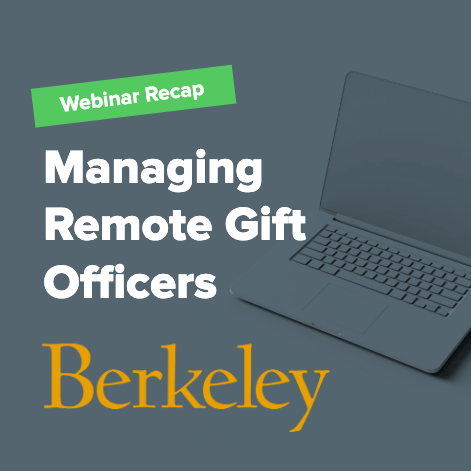Jason Smith, Executive Director of Major Gifts at the University of California at Berkeley, joined us for a live broadcast, and shared the lessons he’s learned from three years of managing a growing a major gifts team, half of which are remote gift officers.
Here’s Why Remote Work Makes Sense
In the last 15 years, remote work has exploded. Thanks to innovations in technology and a growing awareness of the importance of work-life balance, remote work has grown by 159% since 2005. And now 98% of all Americans want to have a job where they can work remotely.
(Not to get all political, but it’s one thing we all agree on!)
Higher ed is in the midst of a talent crisis. The average tenure of a gift officer is 18 months and 51% of fundraisers plan to leave their jobs within the next two years. Opportunities to work remotely can help leaders retain high-performing staff even when they move away, which keeps the focus on building pipeline and closing gifts and away from hiring and onboarding.
The Berkeley Story
Jason’s major gift team now has seven members (out of 18) working remotely. With most of Berkeley’s 400,000+ graduates living in California, 11 fundraisers work from campus and four are located across Southern California. Three years ago, they added gift officers in Buffalo (his East Coast lead wanted to move back home, so this was a way to both retain her talents and bring her closer to her donor base), New York City, and Philadelphia.
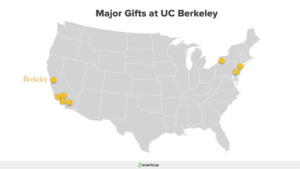
Having gift officers on-location has cut travel expenses by 33%, letting Cal deploy those resources in other ways (including hiring!), but more importantly, puts Berkeley in the backyard of the communities they serve where they can build better, stronger relationships with alumni.
But adding remote development officers isn’t as simple as just letting your fundraisers set up a home office anywhere — it takes intentional thought, planning, and support to make them be effective.
Here are five ways Jason and UC Berkeley are supporting their remote fundraisers.
1) Be Sure It Makes Sense for Your Population
You have to help your remote gift officers be successful and that means putting them in positions (in this case, the literal geographic locations) where they’re most likely to succeed.
Where do you have a critical mass of engaged, wealthy prospects who need qualification and cultivation? Are alumni leaders in those communities asking for more interaction with their alma mater?
With Berkely positioned in Northern California, it made far more sense to place staff in large cities on the East Coast than to keep flying gift officers out four or five times a year on long, expensive trips. Even though they made regular visits, they were only scraping the surface of the philanthropic potential of those areas.
2) Hire Amazing People
You have to hire fundraisers who are inquisitive, entrepreneurial, and can be trusted to work hard every day. That’s true no matter where they are, but especially for your remote teams.
Jason recommended using a tool like EverTrue to find alumni working in development in those key cities. When Berkeley started this initiative, the team built lists of potential recruits and they now have “a larger rolodex for future hiring opportunities.” He also suggested looking at people in other areas of development — the annual fund, for example — who might be interested in a new opportunity. And there’s always “boomerang” employees who have worked at your organization before, moved away, but would be up for coming back.
“While it’s a nice perk to find someone who has familiarity with your school or college it is not at all an imperative,” Jason said. “We’ve found that the most important attribute for hiring successful gift officers is belief and understanding of the values and mission of the university. I know it sounds simple, but these institutional qualities are ingrained in our alumni and donors, and the gift officers who share these build relationships easily.”
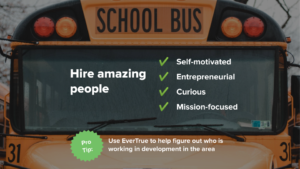
Establish Campus Connections
Building a story bank for gift officers is important so they have news and information to share with donors. The daily (or weekly) campus newsletter is a great place to start, as is your organization’s social media channels. Fundraisers can grab great impact stories from YouTube to relay to donors or open doors to conversations.
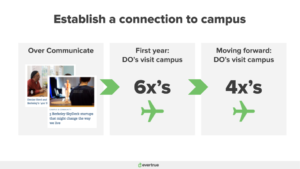
But it’s also important to bring fundraisers on campus so they can get a feel for the environment, meet the team, and join in university traditions. For the first year, Jason has all remote gift officers come to campus six times for key events, including homecoming and all-staff meetings, and four times a year after that. Those regular visits are great for team-building and keeping everyone connected.
Use Technology to Create an Inclusive Environment
It can be hard to be a remote worker. The top two challenges for people who work remote full-time are communication and feeling lonely.
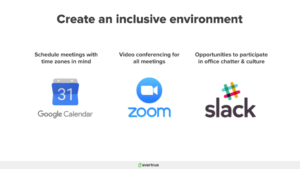
Technology can be a bridge to connection, though. Berkeley uses Zoom (a video chat platform) for every meeting, helping people feel as if they’re in the room even if they’re across the country. Slack, a chat app, allows for both virtual watercooler conversations and sharing wins to keep the team unified and motivated. And the team made an intentional shift to meeting times that work for everyone, no matter which time zone they’re in.
Berkeley also supplies everything remote gift officers need to work effectively: a desk, chair, filing cabinet, printer, phone — oh, and EverTrue, too, for information on the road to easily find and qualify new prospects.
Define Clear Expectations
If you’re introducing remote positions, there’s a natural opportunity for “scope creep,” which you have to avoid. Are your fundraisers also responsible for running events, volunteer programs, and other regional responsibilities? If so, you have to make that clear from Day 1 — and adjust metrics accordingly.
For Berkeley, each gift officer is accountable to hit goals for meaningful interactions, qualification visits, proposals submitted, dollars solicited, and dollars closed — whether they’re on or off-campus. Jason makes adjustments for new MGOs as they ramp up, but once they’ve got their portfolio up-to-speed, they’re all held to the same standard.
The Results at UC Berkeley
Since they made the shift to fully remote positions three years ago, Berkeley has seen some incredible major gift fundraising results.
- Last year, they raised 40% more dollars than the prior year.
- This year, they’re positioned to raise 48% more than FY19.
- They’ve doubled the number of qualifications.
And the best part… they’re now active members of the communities alongside their alumni. As Jason said, it’s much more of a “Mr. Rogers,” neighborhood-driven experience versus flying in and out for an annual trip.
Ready to make the shift?
EverTrue can help frontline teams work faster, qualify more prospects, and stay on top of portfolios. Let us show you how.
